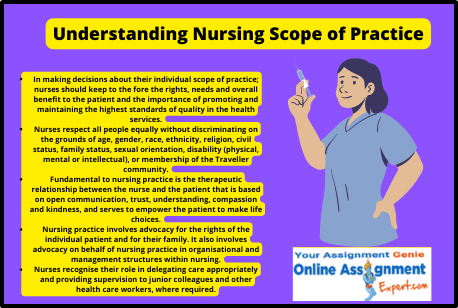
In nursing school, nurses are taught the value of ethics and how they relate to personal and professional conduct. Throughout their careers, nurses continue to build on this foundation of knowledge. Fairness, honesty, and equity in interpersonal, intellectual, and professional relationships are characteristics of ethical behaviour (Alison et al., 2019). Respect for the individual's diversity, dignity, and rights is evidence of this. What are the nine codes of ethics for nurses? You may have wondered if you are a nurse or a nursing student. Nursing ethics assignment help is here to educate you on the nine Nursing Code of Ethics requirements and their corresponding interpretation statements in this article. You'll discover the significance of ethics and how they relate to nursing practice. You'll learn why it's critical to uphold a moral and professional code of ethics, as our professional nursing assignment helps the expert team.
Nurses' core commitments and ideals are established and reaffirmed in the Code. It defines the bounds of professional nursing practice and allegiances and describes the responsibilities of nurses that go above and beyond one-on-one patient interactions.
The nine provisions of the Code of Ethics for Nurses serve as a manual for performing nursing duties in a way that is ethically compliant with the nursing profession and consistent with the provision of high-quality nursing care. In nursing practice assignment help, nursing professionals are engaged in solving complicated medical assignments based on these ethics. The nine principles of the Code of ethics for nurses, along with interpretation remarks, are explained in depth below for the benefit of all nurses.
"The nurse practices with respect and compassion for the inherent worth, dignity, and distinctive characteristics of each individual."
One of the most critical ethical concerns related to professional nursing standards is the idea of respecting one's fellow human beings. Respect for human dignity entails treating every patient as an individual and appreciating their uniqueness. Respecting patients' dignity entails acting with competence and consideration, giving them a sense of worth, and fostering their ability to learn, develop, and value others.
"The patient, whether an individual, family, group, community, or population, is the nurse's primary commitment."
The word "primacy" refers to the state of being first, foremost, or more significant. The phrase "primacy of the patient's interests" refers to the nurse's primary dedication to the person receiving nursing care, the patient. The beneficiary could be a person, a family, a community, or a group. To ensure that the patient accepts the care plan and supports its implementation, nurses should work to give patients opportunities to participate in planning their care.
"The nurse argues for and defends the patient's rights, health, and safety."
The nurse is responsible for protecting each patient's right to privacy and maintaining the confidentiality of all patient data. Promoting a setting that offers both physical and auditory privacy to enable private conversations or consultations is part of fighting for patient privacy and confidentiality. Implementing procedures and policies to safeguard the privacy of patient data is part of it.
"The nurse has power, accountability, and responsibility for nursing practice. The nurse makes decisions and acts compatible with the duty to promote health and give the best care possible."
Activities involving direct patient care, delegating nursing responsibilities, research, education, and management all fall under the umbrella of nursing practice. Nurses are independently accountable for their conduct when giving or delegating care and their patient's care. Nurses must use sound judgement when assigning duties, taking on nursing responsibilities, and conferring with others. It is necessary due to the complexity of healthcare delivery and the changing patterns of healthcare delivery. In addition to exercising power outlined in the standards of care, nurses must maintain responsibility for their acts. To develop these skills, nursing ethics assignments help sample solutions and provide the best guidance.
"The nurse owes the same duties to oneself as one does to others, including the duty to promote health and safety, protect one's integrity and morality, uphold competence, and continue one's personal and professional development."
Nurses need to give themselves the same level of care they give to others if they want to be effective in their jobs. Nurses can promote their well-being by upholding their competence, integrity, and commitment to personal and professional progress. The fifth provision's other interpretation clauses detail how nurses might adhere to the ethical requirement that they have a duty to themselves and others.
"The nurse builds, maintains, and enhances the ethical work environment and employment conditions conducive to safe, high-quality healthcare through individual and group efforts."
Virtues are personal traits or conduct that make one more likely to uphold moral commitments. At assignment help, our experts can elaborate more on this topic. High moral virtue individuals have qualities like courage, compassion, honesty, and patience. Moral virtues in nursing are behaviours that uphold and advance the principles of well-being, health, human dignity, respect, and autonomy. According to a study, a person's physical environment affects their moral judgment and virtue, encouraging the development of virtues or hindering or reducing their development.
"The nurse advances the profession via research and intellectual inquiry, the formulation of professional standards, and the generation of both nursing and health policy," according to all roles and contexts.
All nurses should contribute to improving the nursing profession via knowledge generation, diffusion, evaluation, and application to practice. The development of knowledge depends on intellectual investigation and research. The corpus of knowledge that underpins and improves nursing theory and practice on all levels is widened through scholarly research.
"To defend human rights, advance health diplomacy, and lessen health inequities, the nurse interacts with other health professionals and the public."
The World Health Organization states that "every human being has a fundamental right to the best possible standard of health." The adage "Health is a universal right" places a duty on nurses to support advancing health and human rights at all scales. Access to healthcare services, including preventative, emergency, and trauma care, basic sanitation, and education about the causes, prevention, and management of common health issues, are all included in the universal right to health. It also encompasses the right to potable water, reproductive health, public health, injury prevention, vaccines, prevention and control of endemic illnesses, food security, and other similar rights.
"The nursing profession as a whole, through its professional organizations, must clarify nursing ideals, uphold the profession's integrity, and incorporate social justice ideas into nursing and health policy."
The interpretive statements in this section of the American Nurses Association Code of Ethics related to professional nursing organizations and their functions in providing professional nursing care. Articulation and Assertion Professional nursing associations must uphold and convey nursing ideals to their members. The Code of Ethics for Nurses affirms the need for professional organizations to promote critical assessment and introspection among members of the nursing profession.

The above-mentioned ethics are critical in the academics of learning to nurse. You can take assistance from an Online Assignment Expert and get super-fast academic guidance services at pocket-friendly rates!
Get
500 Words Free
on your assignment today